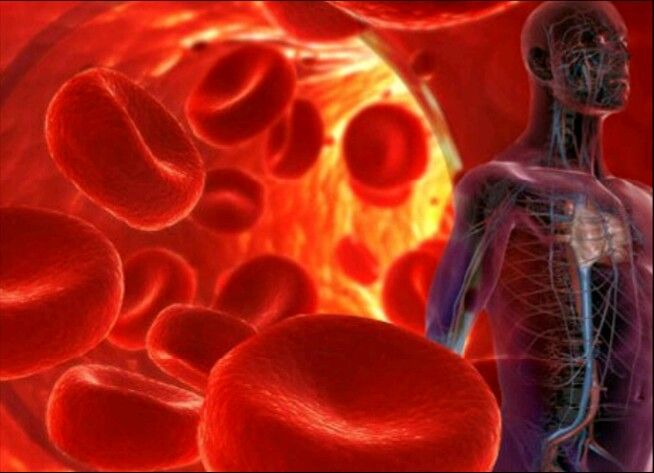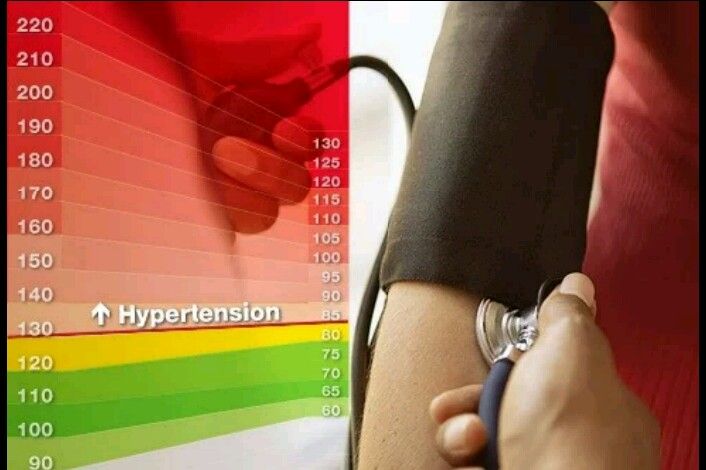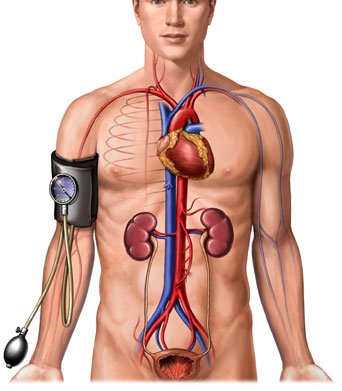Hypertension
Definition: Hypertension is the pressure exerted by the blood against the walls of the blood vessels.  When the heart beats, it creates pressure that pushes blood through a network of tube-shaped blood vessels, which include: arteries, veins and capillaries. This pressure is the result of two forces. The first is the (systolic pressure) occurs as blood pumps out of the heart and into the arteries that are part of the circulatory system. The second one is the (diastolic pressure) which is created as the heart rests between heart beats.
When the heart beats, it creates pressure that pushes blood through a network of tube-shaped blood vessels, which include: arteries, veins and capillaries. This pressure is the result of two forces. The first is the (systolic pressure) occurs as blood pumps out of the heart and into the arteries that are part of the circulatory system. The second one is the (diastolic pressure) which is created as the heart rests between heart beats.
Causes: Essential high blood pressure -which has no established cause. Secondary high blood pressure - there is an underlying cause.Even though there is no identifiable cause for essential high blood pressure, there is strong evidence linking some risk factors of the likelihood of the developing condition.
Factors that can increase the risk of developing high blood pressure.
Age: the risk of developing high blood pressure increases as one gets older.
Family history : if you have close family members with blood pressure, your chance of developing it will be significantly higher.
Ethnic background : African or carribean have a higher risk of developing high blood pressure.
Obesity and overweight : both overweight and obese people are more likely to develop high blood pressure compare to people of normal weight.
Physical inactivity : lack of exercise and sedentary lifestyle increases the risk of high blood pressure.
Gender:high blood pressure is more common in adult men than adult women. However, over 60 years, both men and women are rapidly susceptible.
High amount of salt in the food.
Smoking :causes the blood vessels to narrow due to the nicotine content.
High fat diet (LDL) which causes narrowing of the blood vessels.
Mental stress.
Conditions that cause high blood pressure includes: Diabetes, kidney disease, glomerulanephritis(damage to the tiny filters inside the kidneys) lupus(condition in which the immune system attacks part of the body) such as the skin, organs and joints.
Some medications, for instance, NSAIDS such as ibuprofen.Steroid medications. Combined oral contraceptives, herbal medicines that contain liquorice.Recreational drugs such as cocaine and amphetamines. Antidepressants such as venlafaxine.
Signs and symptoms of extremely high blood blood pressure include:
Severe headache
Blood vision
Fatigue
Dizziness
Irregular heartbeats
Palpitation
Blood in the urine
Profuse sweating
Breathlessness
Nose bleed
N:B:- if you don't notice any of these symptoms dosen't mean that your blood pressure is not high. The normal blood pressure is less than 120millimeter of mercury(mm hg) systolic and less than 80millimeter of mercury (mm hg) of diastolic (120/80mmhg). 

Hypertensive crisis is defined as blood pressure of 180millimeter of mercury(mm hg) or above for the systolic and 120millimeter of mercury (mm hg) or above for the diastolic. (180/120) often caused by skipping of medications or secondary hypertension.
Treatment: there are several treatments of blood pressure which includes :
Lifestyle modifications
Weight loss
Rest
Exercise (aerobic exercise)
Sticking to your prescribed blood pressure medications so long as there is no reaction.
Healthy eating :- Dietary Approaches to Stop Hypertension (DASH) is one example of food plan prescribed to keep blood pressure in order. Which is mainly focused on low sodium and low cholesterol foods such as foods vegetables and whole grains. Limit red meats, alcoholic drinks. Take more of fruits such as carrots, apples bananas. Consume more of fish which is rich in omega 3 fatty oils which contains more of good fat (High density lipoprotein).
Medications include:
Diuretics:- which excrets excess fluid from the body. Such as, laxis.
Calcium channel blockers:- relaxes the blood vessels by inhibiting calcium entrance inside the cells. For instance, amlodipine.
Beta blockers :- they help slow the heart beat as well as helping blood flow through the blood vessels. Such as, propanolol.
Angiotensin converting enzymes (ACE) Inhibitors:- blocks hormones from raising blood pressure. For instance, Captopril.
N:B You shouldn't take these drugs unless prescribed by your doctor. Ensure to check your blood pressure always.
 . American Heart association (AHA). DASHdiet.net.
. American Heart association (AHA). DASHdiet.net.
Thank you for reading. Kindly upvote and comment.